Resiliance and hope: The untold stories of the families of the missing

At the heart of conflict and crisis lies a narrative often untold — the stories of families grappling with the disappearance of their loved ones. The International Day of the Disappeared, observed on August 30th each year, serves as a poignant reminder of the enduring challenges faced by these families. Discover the untold sagas of resilience and hope within the lives of some Syrian families affected by the disappearance of their loved ones due to the Syrian conflict, living in Jordan, and witness their resilience and unwavering spirit in the face of adversity."
Anoud
"Our houses were close to each other, I used to give my neighbours cheese, cream, and everything I had, as if we were one family," this is how Anoud reminisces about her life in the village from which she and her family had to depart, leaving all their possessions behind, due to the armed conflict in Syria.
Anoud not only suffers from the disappearance of her son, but she also misses the sense of belonging to a familiar environment that knew her and that she knew. She misses the morning breakfast gatherings with the people of her village, which she describes by saying, "The people in the village only enjoyed having breakfast at my place."
Today, with the support of the International Committee of the Red Cross (ICRC), Anoud works on her own project to sell dairy products to support her family after they were cut off from their means due to displacement. Anoud considers her current work a source of income and hope at the same time, as she hopes that her son will return to her and she can gather the fragments of her life, perhaps regaining some of what she has lost.
Aziza
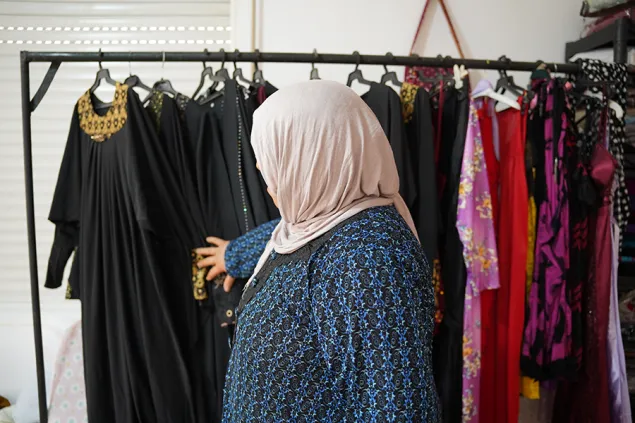
Shouldered with the responsibility of supporting six members of her family in Jordan and Syria, the 63-year-old Aziza found the earth constrained despite its vastness. She bore her share of the calamities and pains left behind by the conflict in Syria, including the loss of loved ones and possessions.
Weighed down by longing and worries due to the lack of news about her son who went missing in Syria, Aziza dedicated most of her time to working to provide the necessary support, especially for those she considered the most vulnerable, such as her divorced daughter and her four children.
Aziza's journey of struggle began years ago with a small self-employment project selling ready-made clothes. For more than a year now she received a grant for the ICRC, to develop her project and maintain a sustainable source of income for herself and the family members she supports.
"Now the income is better, and I'm able to better fulfill my financial obligations here and have paid off some of my debts. Sometimes I also send money to my physically disabled son in Syria," Aziza says as she reflects on the impact of support she has received for the sustainability of her private project.
Aziza's hopes and dreams are realized by seeing her loved ones overcome the difficult circumstances they are going through and triumph over the challenges they face. She also wishes to see and embrace her missing son again, whom she describes as kind, generous, and of good character.
Firyal
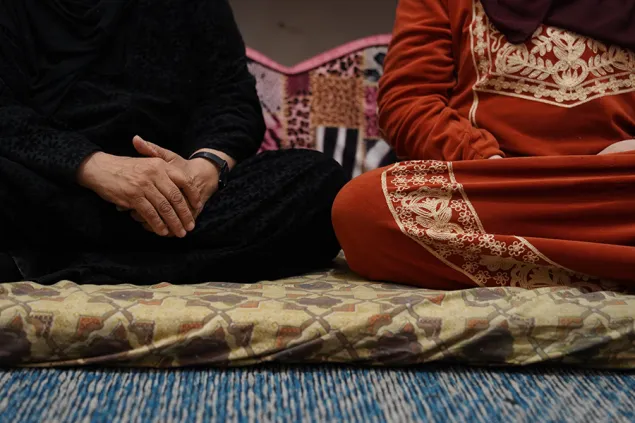
"I used to rely on my husband for everything. He was the breadwinner," this is how Faryal (48) begins her account of the great void left by the absence of her missing husband on her life and on all the members of the family.
Firyal left Syria at the height of the armed conflict more than a decade ago, seeking safety for her children, only to find herself forced to support and care for them after the disappearance of the family's sole provider.
Since then, the burdens of life have weighed heavily on Friyal, but her determination and love for her children were greater than all the challenges she faced.
Lately, with the support of the ICRC, Firyal opened a small grocery store in Mafraq governorate to support her family more sustainably. In addition to being a major source of income that has helped her meet many obligations, Firyal describes the grocery store as a "place for venting" where she meets women who share her experience of loss, coming together as they wait for the day when their loved ones will return.
Laila
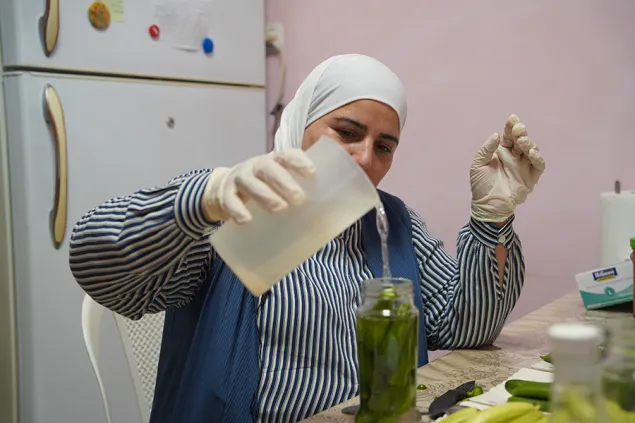
Having left all their belongings behind in Syria due to the armed conflict, Laila (42 years old) and her small family found themselves helpless in the face of the difficult demands of life in displacement, far from their home.
Laila, who was exhausted by the absence of her missing brother for years, struggled and, seized the smallest opportunities that came her way to provide sustenance for her family.
With the dwindling of suitable job opportunities for her unemployed and dejected husband, who was unable to accept the reality of his transformation from a well-off family breadwinner before the conflict to an impoverished and troubled individual struggling to provide the necessary sustenance for his two daughters, Laila was forced to intervene and assist her husband, taking on the responsibility of the family out of love and hope for her daughters and a better future.
More than a year ago, Laila received a grant from the International Committee of the Red Cross (ICRC), that helped her develop a small project she had previously started in the field of homemade pickles.
“My personality has changed a lot. I have a lot of motivation for my daughters. I want to do what I can for them and not depend on anyone. I want them to learn strength from me because they are my support and I am their support,” this is how Laila describes the impact her work has had on her life. Laila sees her work as an opportunity to continue her life in a healthy way, saying, “There is no such thing as zero in life. We can start anew every day.”
Umm Samer's family
Umm Samer, who left Syria with her husband and children and settled in Jordan over ten years ago, shared life's few ups and downs with Abu, her loving life partner and the father of her children as they struggled together to provide the necessary living requirements for their five children.
The effects of the armed conflict in Syria have left deep scars on Umm Samer's soul, especially after the disappearance of her brother, who was her dearest friend. Despite her sadness she moved forward with her life, striving to support her husband in his pursuit of a livelihood. It was not easy for her due to her lack of expertise in a craft or trade that could generate income to assist her husband.
Fortunately, Abu has a high skill in carpentry and furniture restoration. Despite his skill and talent, he lacks the necessary equipment and tools for his work, which poses a significant obstacle for him.
Umm Samer's efforts to support her husband resulted in her receiving a grant from the ICRC, which she used to help her husband expand his business to improve his ability to compete in the market.
"Abu's work, effort, talent, and love for us have sustained the family for a long time. After using the grant to expand his business, our income improved, and we are now able to pay the rent and provide for the children better than before. I hope the business will continue to grow, enabling us to provide a better life for our children."
What saddens Umm Samer the most now is the family's inability to bear the expenses and costs of enrolling any of her children in universities. However, she has not lost hope for a brighter future in which she can embrace her missing brother and witness her children graduate from university someday.
R.A.
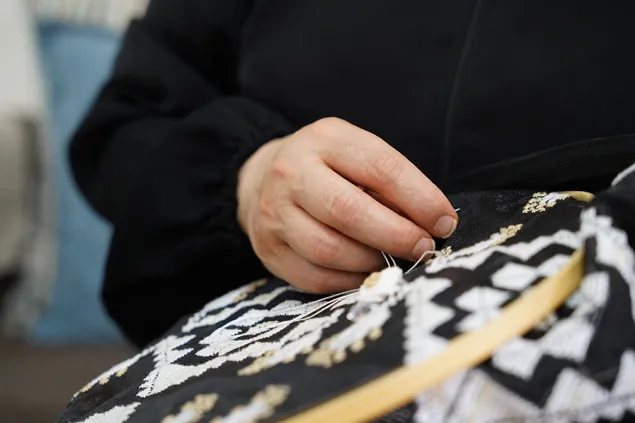
"From hardships come blessings," R.A. sums up her tough journey and the impact of her current work after settling in Jordan following displacement from Syria more than a decade ago. Distant from her missing husband of many years and grieved by the death of her brother and her daughter's spouse due to the conflict in Syria, R.A. found herself alone, weak, and destitute. R.A. did not surrender to the cruelty of life and despair and decided to undertake the impossible for the sake of her children. "I was emotionally devastated, but I feared for my five children. I gathered my strength for the sake of my children and decided to do the impossible for them. I started working in embroidery because I had no other means of support," R.A. says, reminiscing about her beginnings in the difficult profession of embroidery. Through her effort, diligence, and exceptional skill, she was able to achieve remarkable success.
Today, with the support of the International Committee of the Red Cross (ICRC), R.A. has expanded her business and provided employment opportunities for 12 other women. R.A. considers that her current venture has been a direct reason for her ability to continue the education of her sons and daughters, some of whom have now reached the university level.
Rosa
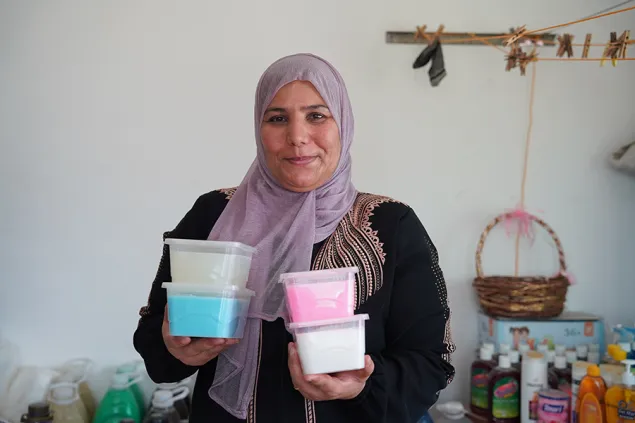
With the disappearance of her husband, the sole breadwinner of the family, at the onset of the armed conflict in Syria over a decade ago and the destruction of the family's only home two years later, Rosa's (52 years old) suffering and that of her four children began before they finally settled as displaced persons in Jordan in 2013.
The family's ordeal and specifically Rosa's intensified when she was diagnosed with cancer after more than a year. Despite the shock, Rosa gathered herself and her determination, and decided to start a new challenging journey. She began the cancer treatment process, from which she recovered after two years before it returned to her again in 2018. Despite her illness, weakness, and exhausted mental state, Rosa started a small project in 2016 to prepare and sell homemade foods and pickles. However, as the disease worsened, she had to change the project, which required a lot of effort and time, and shift to making soap and household cleaners after she received a grant from the ICRC a year ago.
"Now the production has increased and the return is better, which has helped me pay off some of my debts, and I have become able, from time to time, to send money as assistance to my married daughter in Syria. I am satisfied with myself, and with my children, because they gave me hope and inspired me. My resistance to cancer and everything I have done and accomplished was for them and thanks to their support. I miss my missing husband very much, and I hope he will return one day to see how our children have grown up and are now.
The International Committee of the Red Cross implements a program of psychosocial support sessions for the families of missing persons, including beneficiaries of micro-economic support grants, such as the women whose inspiring stories are featured in this exhibition and dozens of others. The aim is to enable them to meet their basic needs and cover their indispensable expenses in sustainable ways that preserve their dignity. The impact of these sessions extends beyond the participants to their family members and general surroundings. “After my daughter attended the psychosocial support sessions, she supported me and made things easier for the two of us. I am proud of her and how she has become and how she has grown,” This is how Rania's mother describes her daughter's experience with the psychological support program sessions.
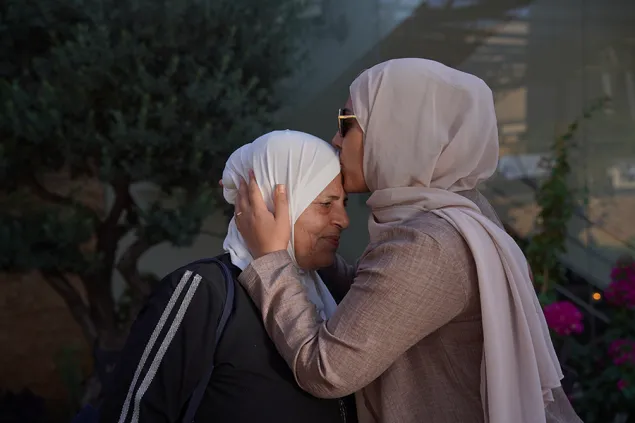
Group psychosocial support sessions are an opportunity to share experiences among those who have experienced loss, which helps them alleviate the psychological impact of this harsh experience. “During psychological support sessions, we sit and comfort each other to get out of the state we are in. Our experiences are shared, we feel each other and know that we are not alone,” says Nawar, one of the participants in the sessions.
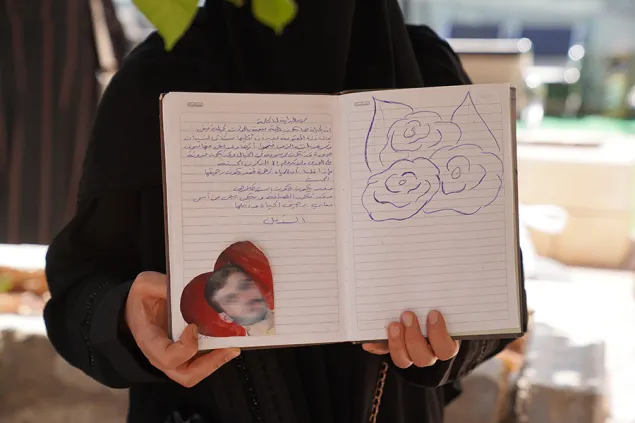
Group psychosocial support sessions also strengthen the participants’ bond with each other and help them create healthy friendships that mitigate the effects of the experience on them. “I have close friends who eagerly await the session days so we can gather. Whenever I feel lonely and stressed, I watch the travel videos I made with them or chat with one of them,” Anoud says, describing the impact the sessions had on her social relationships.




















